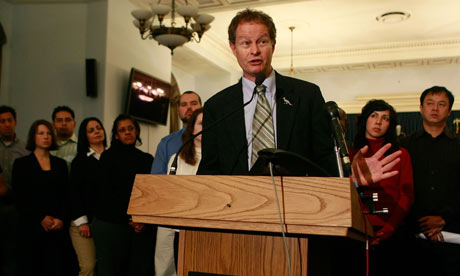Customers call for boycott after Whole Foods chief executive criticises US healthcare reform
John Mackey rejects Obama's healthcare proposals and outrages customers
-

- The Guardian, Friday 21 August 2009
- Article history
Earlier this year, John Mackey, the CEO and co-founder of the US-based Whole Foods retail chain, was asked to name his perfect summer meal.
He began by explaining that he had recently given up all refined oils, including olive oil, as part of his new health kick, before revealing that he now likes nothing better than to sit down to a salad of sweet potato, cooked greens and mung beans, with a dressing of miso, tahini, rice vineger and yeast. If you were looking to construct a stereotype of the typical Whole Foods customer, you'd be hard pressed to match this one.

John Mackey, CEO of Whole Foods, speaks while surrounded by Whole Foods employees during a news conference on Capitol Hill. Photograph: Mark Wilson/Getty Images
Earlier this year, John Mackey, the CEO and co-founder of the US-based Whole Foods retail chain, was asked to name his perfect summer meal.
He began by explaining that he had recently given up all refined oils, including olive oil, as part of his new health kick, before revealing that he now likes nothing better than to sit down to a salad of sweet potato, cooked greens and mung beans, with a dressing of miso, tahini, rice vineger and yeast. If you were looking to construct a stereotype of the typical Whole Foods customer, you'd be hard pressed to match this one.
But Mackey didn't stop there. He added that he was considering "bribing" some of his staff with larger bonuses to help them lose weight should they choose to follow his new healthy-eating regime. And his customers were in his sightlines, too.
"We sell a bunch of junk," he admitted. "We've decided if Whole Foods doesn't take a leadership role in educating people about a healthy diet, who the heck is going to do it?"
Predictably, Mackey's comments attracted the wrong sort of headlines.
To news editors, the story was simple: here was a man admitting that his company was selling rubbish. It had echoes of Gerald Ratner's disastrous remark in 1991 that his jewellery company sold items that were "total crap", and that the earrings on sale were "cheaper than an M&S prawn sandwich but probably wouldn't last as long". Whole Foods had been "ratnered" by its own CEO.
But August is turning into a long, hot month for Mackey. No sooner had the furore of his "bunch of junk" remark begun to reach its sell-by date than he was at it again, this time in the right-leaning opinion pages of the Wall Street Journal, not somewhere considered a natural read for the average liberal Whole Food customer.
Mackey, who often positions himself as a free-market libertarian and is strongly anti-union, chose to criticise the healthcare reforms currently being promoted by President Obama. It proved too much for many loyal Whole Food customers, who in particular objected to his belief that "healthcare is a service that we all need, but just like food and shelter it is best provided through voluntary and mutually beneficial market exchanges". He also went on to say that "unfortunately, many of our health-care problems are self-inflicted: two-thirds of Americans are now overweight and one-third are obese."
The outrage among some Whole Foods customers quickly escalated into calls for a consumer boycott. By yesterday – a week into the furore – almost 20,000 people had joined the Boycott Whole Foods Facebook page, and a dedicated blog (wholeboycott.com) had been set up to follow events and promote discussion.
Mackey, who regularly takes to the blogosphere himself under the username "rahodeb" (an anagram of his wife's name Deborah), quickly posted a response on the Whole Foods website stressing that the Wall Street Journal had used a misleading headline for the article ("Whole Foods Alternative to Obamacare") and this had contributed to the "antagonistic feelings by many". Although the tone of the post offered a sprinkle of humility, he did nothing to refute his original article's core message. Again, he chose to quote Margaret Thatcher: "The problem with socialism is that eventually you run out of other people's money."
The blog had now attracted around 2,000 comments, with views ranging from "God Bless you Mr Mackey. You are a true Patriot. Please run for office!", through to "I love your store but not more than I love my country. You are out of touch with the people who made your store popular and your article proves this point. I will no longer be shopping at your store." Meanwhile, Whole Foods is reported to have sent out letters to some of its aggrieved customers apologising for any offence caused by Mackey's remarks.
Whole Foods can ill-afford this controversy. As one of the world's leading retailers of organic and health foods, it has been at the brunt of the economic downturn, with customers becoming increasingly price sensitive. As all food retailers are noting, customers are struggling to justify the kind of extravagances – artisan cheeses, biodynamic wines, fairtrade chocolates – that made Whole Foods so popular in the boom years.
In 2007, when expansionist desires among retailers were all the rage, Whole Foods boldly entered the UK market, launching a vast flagship store on Kensington High Street in central London. But two years on, the UK arm of Whole Foods is reporting big losses. Earlier this month, it announced that its operating losses for 2008 totalled an indigestion-inducing £36m.
"They have experienced a series of set-backs in the UK," says Natalie Berg, grocery research manager at the consultancy Planet Retail. "The Kensington store is way too big. The rent is far too high. Their attempt to create a flagship store to launch their brand in the UK was a mistake. They should now look to expand their smaller stores, which were formerly known as Fresh and Wild before they were quietly relabelled as Whole Foods stores earlier this summer."
Last month, the US-based parent group Whole Foods Market Inc – which has already been forced to write off almost £50m relating to its foray into the UK — flew its troubleshooter Jeff Turnas to London. He announced that the company is still looking for new sites, but only in the Greater London area. Last September, the Bristol branch of Fresh and Wild was closed with the loss of 60 jobs.
"Whole Foods says it believes the UK market is similar to the Canadian market, but they have underestimated the competition from supermarkets here," says Berg. "And ill-chosen words by a CEO of a company can be damaging. Whole Foods customers are pretty liberal and like to speak freely on such matters."
Thirty-one years ago, a 24-year-old John Mackey launched Whole Foods – then known as Safer Way, an in-joke aimed at the retail giant SafeWay – with his girlfriend Renee Hardy out of a garage in Austin, Texas. It pitched itself as a vegetarian co-op that sourced its produce from local farmers and sold it to the city's university students. It was the quintessential hippy business and the company has traded on these roots ever since. Today, Whole Foods boasts 282 stores, employs 51,000 "team members" and last year recorded sales worth $8bn: it is the big guy who says it tries to look out for the little guy.
But there has always been a hard-nosed, some would say ruthless, streak. "We are Whole Foods, not holy foods," Mackey once said. In an interview three years ago he asked, "Why is it important to be monolithically consistent? Who is?"
If having the ability to upset customers is indeed a strength, then the past few weeks have shown that Mackey has a potency worthy of admiration. But for this month at least he has said his piece: he is reported to have just set off on an extended hiking holiday.
Taking the Mackey
Some of his classic gaffes
"The last thing our country needs is a massive new healthcare entitlement that will create hundreds of billions of dollars of new unfunded deficits and move us much closer to a government takeover of our healthcare system" (August 12, 2009)
The maverick chief executive cheerfully shreds Obama's healthcare programme in an opinion column in the Wall Street Journal.
"Basically, we used to think it was enough just to sell healthy food, but we know it is not enough. We sell all kinds of candy. We sell a bunch of junk" (August 5 2009)
Mackey attempts to outline plans for his company to put more emphasis on healthy eating; his comments are described as a "Ratner moment" in the UK press.
"I like Mackey's haircut – I think he looks cute!" – Rahodeb (17 July 2007)
The internet ID "Rahodeb" becomes notorious when it emerges that it belongs to John Mackey and he has been using it to post positive messages about his company on Yahoo's stock forum.
"By buying [Wild Oats] we will . . . avoid nasty price wars in Portland, Boulder, Nashville and several other cities which will harm [Whole Foods'] gross margins and profitability." (21 June 2007)
Not the smartest thing for a CEO to say when his company is bidding to buy a rival, Wild Oats. His words were in a memo issued to staff. Unsurprisingly, the Federal Trade Commission was soon moved to cite antitrust concerns and blocked the $565m deal.
"The union is like having herpes. It doesn't kill you, but it's unpleasant and inconvenient, and it stops a lot of people from becoming your lover."
Famously anti-union, these words have haunted Mackey for years.

1 comment:
Back in 2008, this Whole Foods, CEO John Mackey (how old is this kid?), was caught posting negative comments (trash talk) about a competitor on Yahoo Finance message boards in an effort to push down the stock price. So now I am suppose to take this loser seriously? Please, snore, snore.
It’s funny we hear Republicans say that they do not want “faceless bureaucrats” making medical decisions but they have no problem with “private sector” “faceless bureaucrats” daily declining medical coverage and financially ruining good hard working people (honestly where can they go with a pre-condition). And who says that the “private sector” is always right, do we forget failures like Long-Term Capital, WorldCom, Global Crossing, Enron, Tyco, AIG and Lehman Brothers. Of course the federal government will destroy heathcare by getting involved, Oh but wait, Medicare and Medicaid and our military men and women and the Senate and Congress get the best heathcare in the world, and oh, that’s right, its run by our federal government. I can understand why some may think that the federal government will fail, if you look at the past eight years as a current history, with failures like the financial meltdown and Katrina but the facts is they can and if we support them they will succeed.
How does shouting down to stop the conversation of the healthcare debate at town hall meetings, endears them to anyone. Especially when the organizations that are telling them where to go and what to do and say are Republicans political operatives, not real grassroots. How does shouting someone down or chasing them out like a “lynch mob” advanced the debate, it does not. So I think the American people will see through all of this and know, like the teabagger, the birthers, these lynch mobs types AKA “screamers” are just the same, people who have to resort to these tactics because they have no leadership to articulate what they real want. It’s easy to pickup a bus load of people who hate, and that’s all I been seeing, they hate and can’t debate. Too bad.
Post a Comment